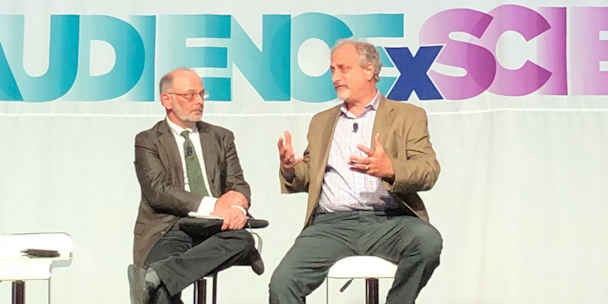GroupM US investment head Lyle Schwartz on what AT&T/Time Warner merger means for future M&A
The approval of the long-announced merger between AT&T and Time Warner has been a fast-moving topic of discussion across the media ecosystem, as well as in research circles across the marketing space.

At the ARF's AudiencexScience conference, GroupM president of investment Lyle Schwarz called AT&T merger a 'watershed moment.' / ARF via Twitter
Lyle Schwartz, president of investment for GroupM North America, said at the ARF’s AudiencexScience conference yesterday that the telecom company’s win over the US Justice Department will set the tone for pending mergers to receive less scrutiny for anti-trust issues.
“The fact that it went through now means that some of these subsequent mergers and acquisitions are now able to flow through the pipeline,” Schwartz said, “because there’s now a runaway, per se."
He added, “What happens now is there’s going to see greater consolidation—we all know that. But there's also going to be a lot of players out there that are gonna have to rethink their position and figure out whether they can go alone or have to combine, and figure out how they have to do either.”
He noted what he considered an interesting facet to AT&T’s acquisition getting an OK: “The other part is because you have an AT&T and a Time Warner, you're talking about a telecommunications company with a content company. So now we actually open this up for all these other areas to start getting into buying content. So we don't know whether it's going to be one digital player, one of the telecommunication companies, or almost anybody.”
In the hours after the judge’s ruling, Twitter reaction referenced courtroom notes that lent credence to Schwartz’s comments.
I’m just sitting down to read the AT&T Time Warner decision and my friends this judge is auditioning to write branded content for the phone company pic.twitter.com/Xnja0YyhlP
— nilay patel (@reckless) June 13, 2018
This affirmative decision on the road to media consolidation now has professionals looking to pending deals such as the one between mobile carriers T-Mobile and Sprint, who will look to keep up with Verizon’s and AT&T reach and access to 5G technology, and the bidding war for Fox between Disney and Comcast, where the winner has access to a slice of Marvel comics rights that has accrued over $2.3bn in revenue across the global box office alone.
Schwartz also gave perspective on the growing M&A conversations between those on buy- and sell-side: measurement and attribution. He said, “I think we're close to the technology that will allow for cross-platform measurement—I don’t call it cross-platform measurement, but device-agnostic measurement. Because really, it's not the platform but the devices that we seem to get hung up on, whether it's a phone or a TV or radio.”
In terms of what it meant for consumers, he said: “They think of the content they want, where they want it: choice, control, convenience, and how much it costs.”
The roadblock for this progress, he said, is in how the pipelines for attribution and measurement are structured. “There’s still a lot of work to be done and the infrastructure of companies on how to put it together. Also, especially on my side of the business: in a lot of situations, advertisers have cut up their budgets across all of these devices. And its hard to say ‘devices’ when we don’t regularly look at it that way, as in online [spend], but we need to start thinking about them.The devices don't regularly aren't really there. It's an online, but you have to be divided that way, so there’s going to have to be reformulation there.”
He added; “I believe we’re on the cusp.” His timeline for the first signs of concrete data from these advanced TV pipelines echoed the words of Matt Spiegel of MediaLink, who had given an estimate of 3 to 5 years before TV metrics reach a point of stability.
What Schwartz showed most concern over in the age of disruption: the emergence of voice. “The most disruptive thing that I'm afraid of is actually voice, he said, “because right now we’re creating scenarios where each network has a personality and we know scheduling and all that. But we talk about it and play out a scenario where someone can just walk in and tell their voice assistant: ‘I want to watch Law and Order,’ and you don’t have to know what channel it’s on. You don’t ever have to go with whatever’s available. It’ll automatically pop up in your screen.
He added: “The age of discovery of programming might diminish to the point where you’re gonna have to figure out how to get the consumer to understand what programming is going on out there. So, I think that is one of the type of products that scares me because I got to figure out how do I get to ask a lot of programming for this device.”
To sum up the accepted merger and what comes next for the US media megaliths, Schwartz said: “Today might be a watershed for the entire exchange in the industry. We'll just have to wait, but I think it's gonna be pretty quick.”
Content created with:

AT&T
Find out more
Time Warner
Time Warner, Inc. is an American multinational mass media and entertainment conglomerate headquartered in New York City.
Find out more
